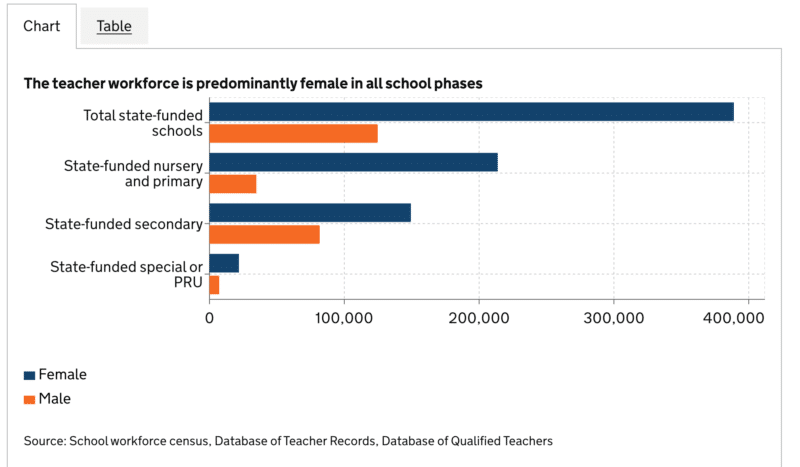At Edapt, the majority of our subscribers are women, reflecting the profession as a whole.
As an organisation where we value ourselves on providing high-quality employment support for all school staff we understand the importance of International Women’s Day (March 8) as a global day celebrating the social, economic and cultural achievements of women.
According to data from the School Workforce Census, the gender makeup of the teaching workforce is consistent over time, and is predominantly female; 76% in 2022/23.
The data suggests that female teachers are less likely than their male counterparts to be in leadership positions (head teachers, deputy heads, assistant heads), however this difference is reducing over time.
You might therefore expect 76% of school leaders to be female. However, in 2022/23, 69% of leadership teachers were female, up from 66% in 2010/11. This compares to 77% of classroom teachers in 2022/23 and 76% in 2010/11. For a deeper analysis of teacher gender in leadership positions see School leadership in England 2010 to 2020: characteristics and trends.

Which issues impact women more disproportionately than men in the profession?
Our casework team at Edapt would definitely say that certain employment-related issues impact our female subscribers more so than our male subscribers. Some of these may be obvious, such as issues around maternity leave, maternity pay, returning to school after maternity leave, the menopause. There are also increased amounts of cases where females receive sexual harassment, are impacted by part-time pay and working hours compared to our male subscribers.
According to research from the MTPT project, which is published on the Chartered College of Teaching website, it suggests that women’s careers progress slows when they become mothers, compared to father’s and to both men and women who do not have children.
According to the Government Equalities Office, there are larger pay penalties due to taking time out of work for maternity leave and moving to part-time work in order to manage the competing demands of work and families.
This study indicated that mothers either experience ‘career stalling’, reduce their status at work or find that they have a lower chance of getting promotion, which slows their progress unless they move organisations.
These findings highlight how career stagnation for women with children must be reviewed through family-friendly policies that are complemented and supported by effective career development (Workplace and Gender Equality Research Programme, 2019).
Within the education sector, the school workforce census (SWCNS) data (DfE, 2022) shows that men reached headteacher roles faster than women, leading to the much-reported gender inequity in school leadership, particularly at secondary level. In primary schools, it took on average 14 years for a man to become a headteacher but 18 years for a woman to become a headteacher.
This rate of progression is interesting when taking into account the fact that half of the incoming teacher workforce are aged 25 or under, and the most likely age for teachers to become first-time mothers is 30 to 35 (Harkness et al., 2019).
With these challenges with progression, there may be more instances of frustration with internal recruitment potentially leading to staff wanting to raise grievances around promotion opportunities and lack of perceived equality.
How does Edapt support school staff?
Thousands of school staff trust Edapt to support them with employment support and advice in their schools. We provide high-quality, apolitical employment support and advice, as well as well-being and mental health support. If you are interested in subscribing you can contact us and we will be more than happy to answer any questions you may have.
Further reading: women in education
- Women in teaching: understanding the gender dimension, Unesco
- Women in education leadership, Education Development Trust
- Role of Women as educators and how they are making a difference by leading the way, Girls.buzz
Subscribe to Edapt today from as little as £8.37 per month to get access to high quality edu-legal support services to protect you in your teaching and education career.
SubscribeLatest Support Articles
Our support articles provide up to date advice on a wide range of topics including pay and conditions, maternity and paternity, dealing with allegations and staying safe online.
